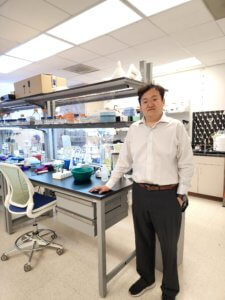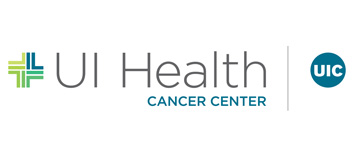July 8, 2022:
This month, the Big Ten Cancer Research Consortium (Big Ten CRC) highlights University of Illinois Cancer Center (UIC) as our featured member. UIC members Kent Hoskins, MD, Oana Danciu, MD and Yu “Tom” Gao, PhD, have been collaborating on BTCRC-BRE15-016, a trial identifying exosome protein biomarkers in patients with advanced hormone receptor-positive breast cancer treated with palbociclib and tamoxifen.
University of Illinois Cancer Center
 Kent Hoskins, MD
Kent Hoskins, MD
Associate Professor, University of Illinois College of Medicine
Director, UIC Familial Breast Cancer Program at UI Health
Co-chair, Breast Cancer Clinical Trial Working Group, Big Ten Cancer Research Consortium
 Oana Danciu, MD
Oana Danciu, MD
Associate Professor, Hematology/Oncology, University of Illinois College of Medicine
Associate Director for Clinical Research, University of Illinois Cancer Center
Director, Clinical Trials Office, University of Illinois Cancer Center
Steering Committee Member, Big Ten Cancer Research Consortium
 Yu “Tom” Gao, PhD
Yu “Tom” Gao, PhD
Assistant Professor, Pharmaceutical Sciences, University of Illinois Chicago College of Pharmacy
Member, University of Illinois Cancer Center, Translational Oncology Program
About BTCRC-BRE15-016
Serving as principal investigator, Dr. Danciu designed the clinical trial and provided samples, while Dr. Hoskins led the trial’s correlative science working with University of Illinois Cancer Center member Tom Gao, PhD, and his lab. In addition to the University of Illinois Cancer Center, the clinical trial was conducted at multiple Big Ten Cancer Research Consortium sites: Penn State Cancer Institute; Masonic Cancer Center, University of Minnesota; Michigan State University Cancer Research; Fred and Pamela Buffet Cancer Center, University of Nebraska; Carbone Cancer Center, University of Wisconsin; and Rutgers Cancer Institute of New Jersey.
 Combining palbociclib – a CDK 4/6 inhibitor that blocks certain molecules involved in promoting the growth of cancer cells – with endocrine therapy (ET) doubles a patient’s survival time from clinical trial initiation to disease progression or death from any cause compared with ET alone in hormone receptor-positive, advanced breast cancer. Not all patients, however, respond, and those who do eventually develop resistance and disease progression.
Combining palbociclib – a CDK 4/6 inhibitor that blocks certain molecules involved in promoting the growth of cancer cells – with endocrine therapy (ET) doubles a patient’s survival time from clinical trial initiation to disease progression or death from any cause compared with ET alone in hormone receptor-positive, advanced breast cancer. Not all patients, however, respond, and those who do eventually develop resistance and disease progression.
Over the past decade, researchers have discovered that exosomes – membrane-bound extracellular vesicles that are released from tumors into the bloodstream that contains proteins and other molecules derived from the tumor – can promote tumor development and progression. Through his research, Dr. Hoskins provided analysis of exosome cargo which can provide a “dynamic and functional read-out of biological pathways that are activated in cancer cells.”
By examining differences in the protein content of exosomes prior to treatment, Dr. Hoskins, Dr. Gao and his laboratory were able to predict which tumors are likely to respond to the treatment and which patients are unlikely to respond, “which if confirmed in larger studies could lead to development of biomarkers to improve the selection of patients for this treatment,” he said.
Dr. Hoskins and Dr. Gao utilized single-cell mass spectrometry, a powerful new technique for proteomic analysis, to examine the exosomes. By examining the differences in the exosomes protein content prior to treatment, “we were able to predict which tumors are likely to respond to the treatment and which patients weren’t. Should this be confirmed in larger studies, it could lead to developing biomarkers to improve the selection of patients for this treatment,” he said. “We will continue to use this proteomic approach to identify the mechanisms of drug resistance that emerge in the cancer cells as they are exposed to these medications.”
More than 700 exosome proteins were discovered in the blood samples. Significant enrichment of exosome-specific markers were observed when comparing patient samples with healthy donor samples. Exosomal protein networks in pretreatment samples predicted treatment response with 95% sensitivity and 85% specificity in unsupervised clustering.
Ultra-sensitive proteomic analysis combined with deep learning methods provides a detailed picture of the proteome landscape of plasma exosomes in advanced breast cancer patients and is ideally suited for serial analyses to study the emergence of resistance mechanisms, Hoskins said. The approach also demonstrated unparalleled accuracy as a predictive biomarker to identify patients unlikely to respond to CDK 4/6i and ET.
“Samples collected over the course of a trial are a valuable resource to identify mechanisms of drug resistance that develop in the tumor during study treatment,” Hoskins said. “This can provide important insight into new approaches to prevent the emergence of resistance to treatment.”
About the Big Ten Cancer Research Consortium: The Big Ten cancer centers have united to transform the conduct of cancer research through collaborative, hypothesis-driven, highly translational oncology trials that leverage the scientific and clinical expertise of Big Ten universities. The Big Ten Cancer Research Consortium creates a unique team-research culture to drive science rapidly from ideas to treatment-changing paradigms. Within this innovative environment, today’s research leaders collaborate with and mentor the research leaders of tomorrow with the unified goal of improving the lives of all patients with cancer.
About the Big Ten Conference: The Big Ten Conference is an association of world-class universities whose member institutions share a common mission of research, graduate, professional and undergraduate teaching and public service. Founded in 1896, the Big Ten has sustained a comprehensive set of shared practices and policies that enforce the priority of academics in the lives of students competing in intercollegiate athletics and emphasize the values of integrity, fairness and competitiveness. The broad-based programs of the 14 Big Ten institutions will provide over $200 million in direct financial support to more than 9,800 students for more than 11,000 participation opportunities on 350 teams in 42 different sports. The Big Ten sponsors 28 official conference sports, 14 for men and 14 for women, including the addition of men’s ice hockey and men’s and women’s lacrosse since 2013. For more information, visit www.bigten.org

















Subscribe to the Big Ten CRC Newsletter X
X Facebook
Facebook YouTube
YouTube